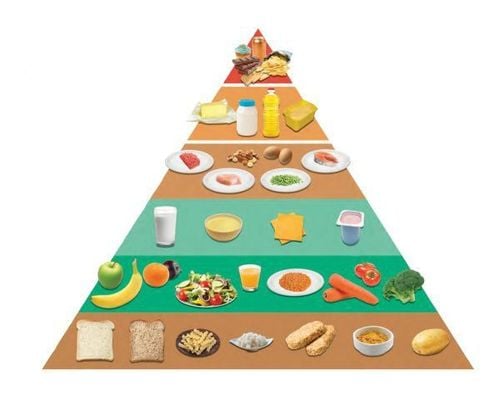This is an automatically translated article.
The article is professionally consulted by Master, Doctor Phan Ngoc Hai - Pediatrician - Neonatologist - Vinmec Danang International General HospitalThe foods a baby eats and drinks during the first few years of life can affect their health for many years to come. That's why it's important for parents to encourage their children to eat nutritious foods and to find ways to help them eat well, making eating easier for them. Feeding your baby well is part of maintaining a healthy diet and good health.
1. Feed your child well and don't prolong the meal for more than 30 minutes
Both parents and children want mealtimes to be as comfortable as possible. Children can both eat well and be assured of healthy foods that help them thrive. However, building a reasonable eating schedule for children is not easy. For young children, setting a fixed mealtime can be difficult. At this age, children are gradually learning to feed themselves and do not want to receive help from parents. Children may not want to eat with adult help. However, having a scientific eating habit is still very important and beneficial for children's later life.Many parents think that if children can sit on the high chair long enough, they will be able to eat all the food that is laid out in front of them. However, prolonging the feeding time only makes children feel frustrated. Mealtimes become a psychological battle between parents and children. According to many statistics, 30 minutes is the average eating time for children to be supplemented with enough food to meet their calorie and energy needs.
The first thing to do before applying good feeding practices is to always let the child sit at the table when eating. This principle should be ensured because:
This is the ideal time for you and your child to interact and have fun talking. It will be easier for a child to finish a meal in 30 minutes if he is not wandering around, carrying food or drink throughout the day. Sitting is the safest position for your baby. Avoid lying down when eating or drinking because children easily choke food into the respiratory tract. Walking or running while eating can increase the risk of choking.

Cho trẻ ăn ngon với thời gian không quá 30 phút
2. How to help children eat well
To make your baby feel comfortable and delicious when it's time to eat, parents can refer to the simple tips below, including:
For young children, let them suggest you how often they need to feed and how long to breastfeed. Recognizing your baby's cues will help build and maintain breast milk production to meet your baby's needs. If you're bottle-feeding, it's also important to monitor your baby's signs. For example, don't try to get your baby to drink the last few milliliters of milk in the bottle if he's not interested. Try not to compare your baby with other babies. All babies have their own way of eating that is appropriate for their own pace of development. If your baby wants to feed more often than before, he may be going through a growth spurt or struggling with an illness. If your baby is easily distracted, find a quiet place to feed to minimize interruptions. As your baby begins to eat, prepare small, soft foods (such as bananas) that your baby can pick up and eat on their own. Mentally prepare for when children learn to eat. Don't be surprised if there seems to be a lot of food splattered on your baby's face. Only a small amount of food actually goes into the baby's mouth. It's part of the child's experience and encourages good eating. Limit sugary, high-fat foods like candy, ice cream, and cookies, especially if your child has cravings. You want to make sure your child gets the maximum nutritional value from the food he or she eats. Because toddlers have small stomachs, they usually eat five or six times a day (three meals and two or three snacks) rather than three meals like adults. Just make sure snacks are healthy foods too. Feed your baby delicious food by decorating the food beautifully, this will stimulate the baby's curiosity.

Món ăn đẹp mắt là một trong các cách giúp trẻ ăn ngon
3. Some foods help children eat well
To make your child more interested in eating every day, you should pay attention to add some of the following foods:
Water: let children eat well by giving them 1 glass of water 30 minutes before each meal. Children should start their day with a glass of water, even before milk. Filtered water has the effect of increasing the secretion of gastric juice and enzymes that help stimulate digestion and increase appetite. Zinc-rich foods: Zinc is an important micronutrient, necessary for many physiological functions in the body such as strengthening the immune system, regulating antioxidant capacity, and supporting growth and development. A zinc deficiency can lead to loss of appetite, weight loss, diarrhea, and an increased risk of infection. Some good zinc-rich foods for kids include chicken, pumpkin seeds, beans, mushrooms, milk, and whole grains. Iron-rich foods: Low levels of iron in the blood are known to be associated with decreased appetite in children. Some studies indicate that at least 1 in 8 children tends to be anemic before 2 years of age. Iron requirements in children vary with age. Children under 9 years old need about 7 to 10 mg of iron per day while children over 9 years old need about 8 mg of iron per day. Parents should include more palatable iron-rich foods, including dark green leafy vegetables, eggs, and lentils in their child's diet. Providing iron and vitamin C increases the body's ability to absorb and use iron. When knowing how and menus to help children eat well in the early stages of life, parents should add this food group to their daily meals to help children develop comprehensively and reduce the risk of diseases.
Children who do not eat properly are at risk of micro-mineral deficiency causing anorexia, growth retardation, malabsorption,... If they notice the above signs, parents should supplement their children with products. The supplement contains lysine, essential micro-minerals and vitamins such as zinc, chromium, selenium, and B vitamins to help fully meet the nutritional needs of children. At the same time, these essential vitamins also support digestion, enhance nutrient absorption, help improve anorexia, and help children eat well.
Parents can learn more:
Signs of zinc deficiency in children
Micronutrient deficiency and failure to gain weight in children
If there is a need for pediatric consultation and examination at Vinmec Hospitals under the medical system nationwide, please book an appointment on the website (vinmec.com) for the best service.














